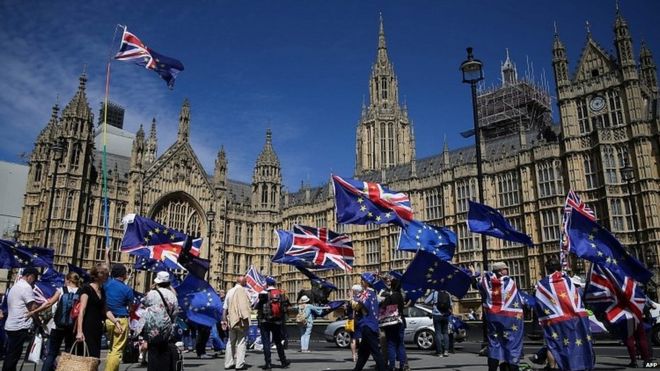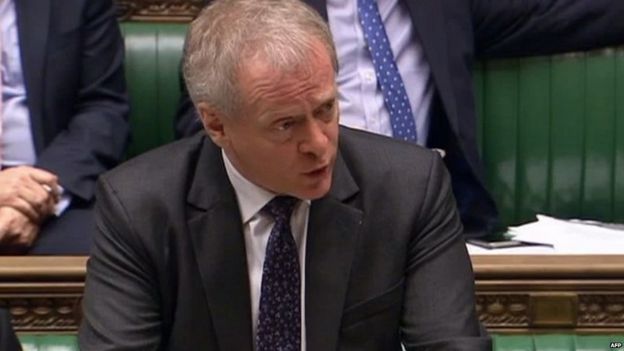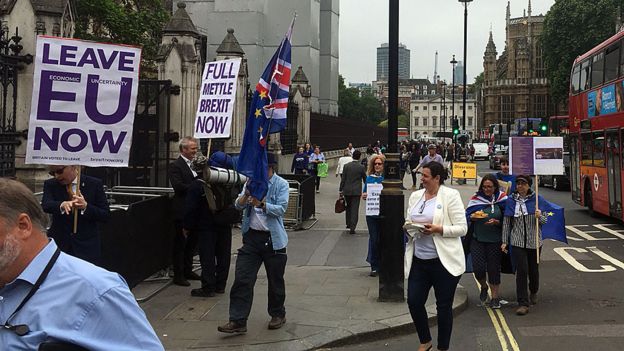
MPs should not “undermine” the UK’s position when they vote on the EU bill, Brexit Secretary David Davis says.
Opening two days of debate, Mr Davis said a bid to give Parliament more control would tie ministers’ hands and lead to a bad deal for the UK.
MPs then accused each other of trying to “wreck” Brexit and, from the other side, being “zealots” who wanted to sideline Parliament.
Earlier the government was hit by its first resignation over Brexit.
Justice Minister Phillip Lee said Parliament was being sidelined and that he could not support “how our country’s exit from the EU looks set to be delivered”.
- Live updates: MPs debate EU bill changes
- Minister quits government over Brexit
- How big a problem is Lee’s resignation for May?
- The Brexit amendments MPs are voting on
Starting the Commons debate, Mr Davis told MPs the bill’s “primary purpose” was to ensure a “functioning statute book” on the day the UK leaves the EU, 29 March 2019.
The most tightly-contested amendment is likely to be the call for Parliament to decide what happens next if MPs decide they do not like the UK-EU Brexit deal.
Mr Davis said this would represent a “profound constitutional shift” and that the government, not Parliament, should be in charge of international negotiations.
Tory MP Sir Edward Leigh agreed, saying the change would amount to a “wrecking of the will of the people”, and Sir Bill Cash said it was “just a cover for a reversal of the decision” to leave the EU.
But pro-EU Conservative veteran Ken Clarke criticised “real zealots” who were trying to “stop this Parliament playing any part in the process”.
The government’s offer to make a statement if the Brexit deal was not approved by MPs would amount to saying “Oh House of Commons, get lost”, he claimed.
Another likely Tory rebel, Anna Soubry, criticised some of her Conservative colleagues, saying their “life’s ambition” was to take the UK “over the cliff to the hard Brexit”.
Ms Soubry also raised threats made to MPs over the issue, saying one of her colleagues needed six armed protection officers when attending a public event.
As the debate continued, the government tried to convince potential rebels to back down, with Solicitor General Robert Buckland offering to hold talks with one of them, former attorney general Dominic Grieve, on Wednesday.
The first votes are under way.
Other amendments being debated are on removing the precise day of Brexit from the wording of the bill, and scrutinising ministers’ powers to make changes to laws when they are repatriated from Brussels.
Minister resigns over Brexit

Mr Lee has called for a referendum on the final Brexit deal
Phillip Lee has been a junior justice minister since July 2016, having first been elected as the Bracknell MP in 2010.
Explaining the reasons for his resignation, he cited the government’s opposition to the “meaningful vote” amendment, saying this position “breaches fundamental principles of human rights and Parliamentary sovereignty”.
He also raised concerns about the economic impact of leaving the EU, saying Brexit had turned out to be much more complicated than first thought.
The UK should “pause, extend or revoke” the Article 50 process which formally triggered its departure from the EU, he said, calling for another referendum once ministers’ chosen path becomes clear.
Pro-EU campaigners hailed his resignation as significant in their calls for a referendum on the UK and EU’s final Brexit deal.
Brexit-backing former Tory leader Iain Duncan Smith said he was surprised, adding: “I didn’t realise he felt this strongly.”
Mr Duncan Smith said the amendment giving more power to Parliament would be “disastrous” and allow the House of Lords to “block the whole passage of Brexit”.
BBC political editor Laura Kuenssberg said the numbers were still “rather dicey” for the so-called meaningful vote amendment.
It would mean ministers “must follow any direction” set by a House of Commons motion if Parliament rejects the final Brexit deal or negotiations run out of time.
The government says this would bind the UK’s hands in the negotiations.
- Brexit: All you need to know
- Why is the customs union so important?
- Flashpoints ahead for the Brexit bill
Speaking earlier on BBC Radio 4’s Today programme, Mr Davis said a Parliamentary vote on the Brexit deal did not give “the ability to reverse the decision of the referendum”.
Asked what would happen if MPs rejected the deal, he said there would be no time to restart negotiations, with the UK leaving the EU in March 2019.
“If they throw it out, well they throw it out,” he said.
Rebels have dismissed the government’s amendment, a commitment by ministers to make a statement within 28 days should MPs vote down the package negotiated by Mrs May.
Customs compromise deal?

Pro and anti-Brexit protesters demonstrated outside Parliament ahead of the votes
A showdown over customs seems to have been averted after a compromise amendment was accepted by the government – which means it has agreed to report to Parliament by October on efforts to negotiate a “customs arrangement” with the EU after Brexit.
The fallback position has won the backing of a cross-section of leading Tory MPs on either side of the Brexit argument, avoiding for now a showdown over calls – backed by the House of Lords earlier this year – for the UK to remain in a fully-fledged customs union with the EU after it leaves.
Mr Davis said a “great deal of progress” had been made in negotiations, saying he was expecting both a withdrawal agreement and the “substance” of the UK and EU’s future relationship to be finalised in October.
He also described as “nonsense” reports he threatened to resign over the wording of last week’s “backstop” plan to avoid border checks in Northern Ireland.
The EU withdrawal bill is the legislation aimed at ensuring the UK has a smooth transition out of the EU, and will mean EU law is no longer supreme in the UK.
To avoid a sudden “cliff edge” on Brexit day, 29 March 2019, it would also convert existing EU law into UK law so the government and Parliament can decide at a later date which bits they want to keep or change.
The House of Lords has put forward 15 specific changes to the bill, but the government wants to kill off most of these changes.
However, numbers in the House of Commons are finely balanced, with the Conservatives not having a majority and needing the help of Northern Ireland’s Democratic Unionist Party to get their way.
May: Send the EU a message
On Monday, Mrs May told her MPs they “must think about the message Parliament will send to the European Union this week”.
“I am confident I can get a deal that allows us to strike our own trade deals while having a border with the EU which is as frictionless as possible,” she said.
“But if the Lords amendments are allowed to stand, that negotiating position will be undermined.”
Labour, which is backing 14 out of the 15 amendments, is urging Tory rebels to seize the chance to “decisively shape the course of the negotiations”.
Jeremy Corbyn’s party is also divided on Brexit, with several MPs unhappy Labour is not backing a bid to keep the UK part of the EU’s single market, like Norway.
Laura Kuenssberg: Squeaky moment or not?
There is still a chance of a squeaky moment for the government, or having to rely on votes from some Labour MPs, on a move to give Parliament more power if MPs vote to reject the final Brexit deal.
Sources tell me the numbers are still rather dicey for that so called “meaningful vote” amendment that will take place tomorrow.
There are discussions ongoing among potential rebels about whether they should deploy their forces.
Some of them believe, as they do on the customs issue, that they have the numbers to beat the government if they decide it’s the right moment. Appeals for party unity in the last couple of days, and the compromise on customs seem to have had some sway.
What MPs will be voting on
The government opposes the following Lords amendments:
- Granting new powers to oversee changes made to EU law by the government
- Removing the precise day of Brexit from the wording of the bill
- Removing a section allowing ministers to use secondary legislation to establish when individuals can challenge the validity of retained EU law after exit
- Only let ministers use delegated powers to amend retained EU law where “necessary”
- Preventing ministers from using delegated powers to implement the UK-EU Withdrawal Agreement
- Make staying in the European Economic Area, like Norway, a “negotiating objective” for the UK
- Transferring the EU’s Charter of Fundamental Rights into UK law
- Allowing “enhanced scrutiny” when ministers use delegated powers to change EU employment, equality health and safety, consumer and environment rules
The government has proposed its own version of these ones:
- Giving Parliament the power to decide what happens if MPs and peers reject the final Brexit deal
- Explicitly preserving cooperation between Northern Ireland and the Republic and commit to no new border arrangements without the agreement of the UK and Irish governments
- Allowing people to challenge UK law if it fails to comply with the general principles of EU law
- Forcing ministers to maintain EU environmental principles in domestic law after Brexit
- Compelling ministers to aim for a deal allowing unaccompanied child refugees to join relatives in the UK
The government has accepted this amendment:
- Allowing the UK to replicate EU law made after Brexit day and continue to participate in EU agencies
The government is backing a compromise backbench amendment on this:
- Forcing the government to report on “steps taken to negotiate a customs union with the EU” by 31 October
Source: https://www.bbc.com/news/uk-politics-44446633
[Disclaimer]







